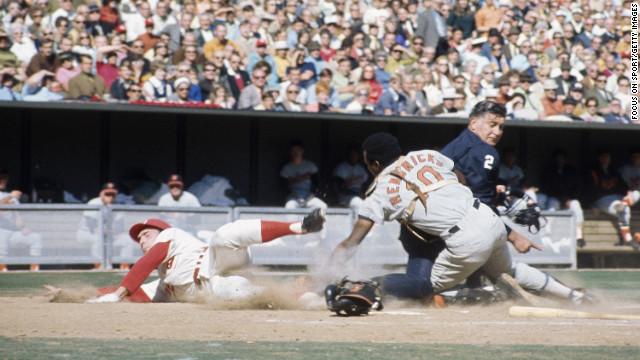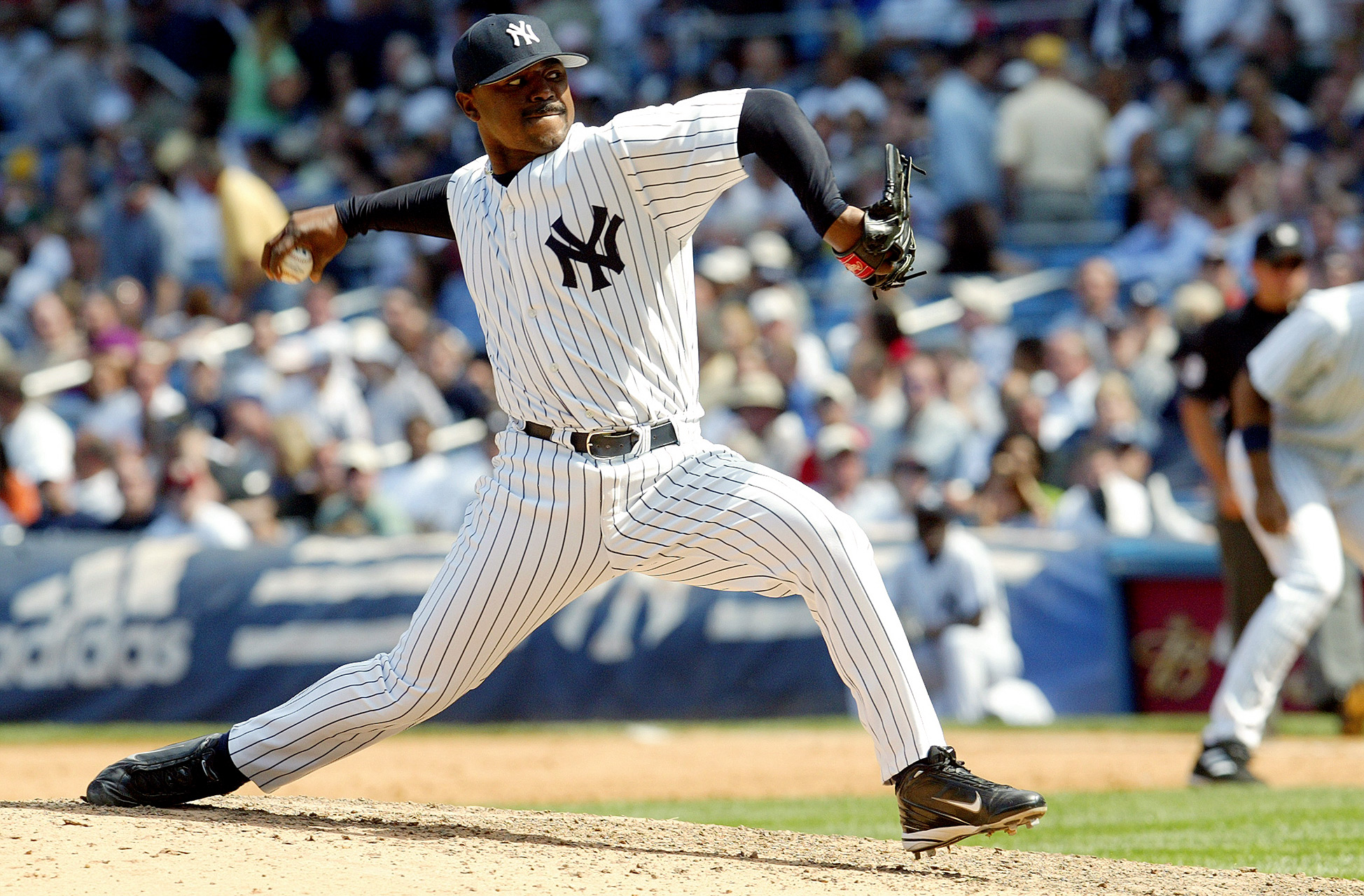| Rollins has a better Hall of Fame case then you realize (LATimes) |
NL East
Atlanta Braves
Nobody on the Braves at present seems to have a great shot at induction. Nick Markakis is already more than halfway to 3,000 hits at the end of his age-30 season, but even if he gets there he'll probably be remembered more as a Johnny Damon complementary type of player.
Miami Marlins
Giancarlo Stanton
If that dude stays healthy (no more Tony Conigliaro-esque scares), he's going to end up in Cooperstown. It's a given.
New York Mets
David Wright
Peaked early but has had enough success since to keep him on pace to finish among the game's all-time great third basemen. The seven-time All-Star just turned 32 and is already at 50 bWAR, which means he only needs to play like an average regular over the rest of his contract to get into Hall-territory.
Philadelphia Phillies
Jonathan Papelbon
One of the best closers ever, hands-down. Has been phenomenal for a decade now and remained effective into his mid-30s. Might not be Mariano Rivera, but who is?
Chase Utley
Utley's counting numbers won't blow anybody away, but his towering five-year peak and subsequent stretch of solid seasons should be enough to get him in. The 36 year-old is already worthy with 61.5 bWAR; now he just needs to pad his career totals. Would be great if he could get to 2,000 hits--he's 431 away.
Washington Nationals
Bryce Harper
Like Mike Trout, I'm willing to concede him a spot in Cooperstown based on how ridiculously good he was at such a young age.
NL Central
Chicago Cubs
The Cubbies are loaded with young talent and probably have a good number of Hall of Famers on their team or about to arrive, but it's just too early to tell.
Cincinnati Reds
Joey Votto
Perhaps the best hitter in baseball when healthy, the 2010 NL MVP is under contract for nine more years at least, which will give him plenty of time to rack up impressive career numbers. Unless his career dissolves Don Mattingly-style, he'll get to Cooperstown.
Milwaukee Brewers
Their best candidate has been caught using PEDs twice, so yeah. Francisco Rodriguez, last seen with the Brew Crew, has compiled 348 saves at the end of his age 32 season, so 400 is a very good possibility and 500 is attainable.
Pittsburgh Pirates
'Cutch could very well make it in. See below.
St. Louis Cardinals
Matt Holliday
Has been an outstanding hitter for more than a decade and is coming up on 2,000 hits and 300 homers. Proved he could still be a great hitter away from Coors Field and has continued to put up big numbers as pitching has overtaken the game.
NL West
Arizona Diamondbacks
Sorry, D-backs. Grit only gets you so far, and usually not to Cooperstown.
Colorado Rockies
Troy Tulowitzki
His pre-30 career arc is eerily similar to Nomar Garciaparra's, which is to say he'd have to be chronically injured throughout the rest of his playing days to screw up his Cooperstown chances.
Los Angeles Dodgers
Clayton Kershaw
If Kershaw retired tomorrow we'd remember him the same way we remember Sandy Koufax. Reached 40 bWAR after his age 26 season, so even if he craps out at 30 he'll have probably accomplished enough by then.
Jimmy Rollins
J-Roll is going to have a very interesting case, especially since his most similar statistical oomp is Barry Larkin (and his second-best is another worthy Hall of Famer--Alan Trammell). A great defensive shortstop with power and speed, he's going to wind up with around 1,500 runs, 2,500 hits, 500 doubles, 500 steals, 250 home runs, and 1,000 RBI. The sheer volume of his counting numbers are going to be hard to overlook, even if his peak wasn't that great (2007 NL MVP notwithstanding).
San Diego Padres
Even with all their recent trades and added star power, I still don't consider any Padres to be probable Hall of Famers. Maybe Matt Kemp...
San Francisco Giants
Tim Hudson
Huddy has had quite the career, which has seen him win 214 games (most among active pitchers) while piling up more than 3,000 quality innings (122 ERA+). The end if probably near as he'll turn 40 next year, but he's remained effective into his late 30s and could have one more solid year left in him. Pitching for San Francisco won't hurt.
It's possible
Aramis Ramirez
One of the better-hitting third basemen to ever play the game, but probably needs a few more productive seasons so he can hit some major milestones such as 400 home runs, 500 doubles, 2,500 hits, and 1,500 RBI. If he hits those benchmarks, it's going to be hard to leave him out.
Adrian Gonzalez
Having a Mark Teixeira-type career, but will need several more big seasons to be a legit candidate.
Carl Crawford
Was so good during his 20s that he'll have a good chance if he can just last into his late 30s (kinda like Tim Raines or Kenny Lofton).
Ryan Braun
See Crawford, Carl.
Jon Lester and Cole Hamels
Both need to keep it up through the end of the decade at least, but if they do their combination of postseason and regular season success should carry them to Cooperstown.
Justin Upton and Andrew McCutcehn
Have accomplished so much already, but their only midway through their primes and still have a lot of baseball left.
Starlin Castro, Jason Heyward, Buster Posey, Paul Goldschmidt, Jay Bruce, Madison Bumgarner
All are off to amazing starts--check back in five years.








